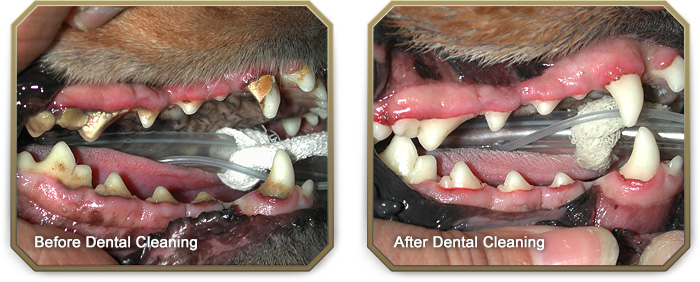Pet Dental Care at Slidell Veterinary Hospital
 Good dental hygiene, combined with regular dental check-ups and cleanings, can increase your pet's health, vitality, and well-being and add additional years to his or her life. If left untreated, dental disease can not only be painful and inhibit proper nutrition, but it can also lead to serious systemic issues that may threaten your pet's health before symptoms are noticeable. For example, oral bacteria that enter the bloodstream can damage your pet's kidneys, heart or liver. Proper dental care not only prevents dental and systemic disease, but it also helps minimize the lifetime cost of care for your pet.
Good dental hygiene, combined with regular dental check-ups and cleanings, can increase your pet's health, vitality, and well-being and add additional years to his or her life. If left untreated, dental disease can not only be painful and inhibit proper nutrition, but it can also lead to serious systemic issues that may threaten your pet's health before symptoms are noticeable. For example, oral bacteria that enter the bloodstream can damage your pet's kidneys, heart or liver. Proper dental care not only prevents dental and systemic disease, but it also helps minimize the lifetime cost of care for your pet.
The veterinarians and medical team at Slidell Veterinary Hospital understand the very important role that proper oral hygiene plays in the overall health of your pet. That is why our veterinarians and staff members have completed multiple hours of continuing education and hands-on training in veterinary dentistry.
Dental Services for Your St. Tammany Parish Pet
At Slidell Veterinary Hospital, we believe that the centerpiece of good dental care is a complete oral exam followed by a thorough cleaning. At our Northshore veterinary hospital, your pet's dental cleaning includes:
- Oral examinations under anesthesia
- Diagnosis and treatment of periodontal disease
- X-rays
- Supra and subgingival ultrasonic scaling
- Tooth extractions
- Polishing
- Antiseptic mouth rinse
- Irrigation
- Fluoride application
Should we find any issues, such as evidence of gum or tooth erosion, gingivitis, or excessive plaque buildup, we will discuss this with you and offer treatment options for your pet. We are experienced dental practitioners and are capable of offering a number of dental procedures, including periodontal therapy and oral surgeries.

Dental Care at Home
Prevention is the best protection from periodontal disease. Preventing periodontal disease by keeping your pet's teeth and gums healthy isn't just a job for your veterinarian; it's your job too. While nothing can take the place of regular visits to Slidell Veterinary Hospital for checkups and cleanings, ongoing follow-up oral care at home is just as important in controlling plaque and tartar formation.
The goal of home dental care is to remove plaque before it mineralizes into calculus (tartar), a process that occurs within days of a teeth cleaning. Brushing your pet's teeth is the single most important procedure you can do to maintain good oral health. If performed regularly, brushing dramatically decreases the incidence of gingivitis and increases the interval between teeth cleaning appointments.
Brushing your pet's teeth is best started at a young age, before the adult teeth erupt. The younger the animal is, the more likely he or she is to accept it. Regular brushing not only keeps your pet's teeth clean and healthy, it also enhances the bond between you and your pet. If you are unsure of how to brush your pet's teeth, please ask a staff member at Slidell Veterinary Hospital for instructions. We are happy to instruct and/or demonstrate to you the best and easiest method.
You should also be able to recognize the signs of poor oral health. If you notice any of the following, you should contact us and make a dental appointment for your pet:
- Persistent bad breath — one of the first signs of dental disease
- Tartar or plaque buildup (ask your veterinarian how to identify them)
- A yellowish-brown crust of plaque on the teeth near the gum line
- Red and swollen gums
- Pain or bleeding when your pet eats or when the mouth or gums are touched
- Pawing at the mouth
- Decreased appetite or difficulty eating
- Loose or missing teeth
Also, please remember to always use tooth paste specifically made for pets, not for people. If brushing your pet's teeth is not possible, ask a staff member to help you select the most effective dental products for your pet.
For more information about our dental services, please email or call us at (985) 643-4822. We are always happy to answer any questions you may have.